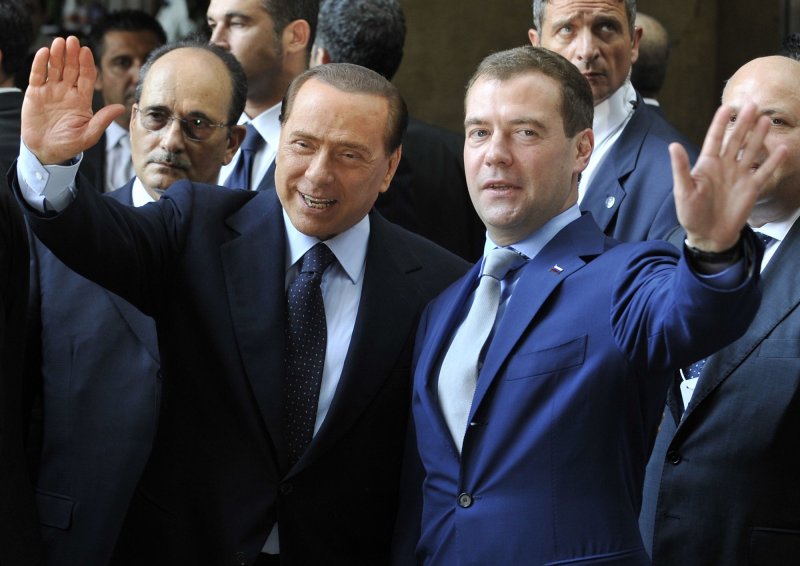Italian Prime Minister Silvio Berlusconi (R) and Russian President Dmitry Medvedev wave after their meeting at the Prefecture Palace in Milan July 23, 2010. UPI Photo/Alex Volgin.. |
License Photo
BERLIN, Nov. 29 (UPI) -- Italian Prime Minister Silvio Berlusconi parties too much, Turkish leader Recep Tayyip Erdogan listens almost exclusively to Islamist advisers and German Foreign Minister Guido Westerwelle, if challenged, becomes feisty and arrogant.
Those were three of numerous American diplomats' assessments revealed Sunday, when news organizations around the world published excerpts from hundreds of thousands of U.S. State Department documents that were leaked by online whistle-blower WikiLeaks.
The classified documents, an unusual peak into the hidden world of backroom diplomacy, were gathered by U.S. diplomats in Washington and around the world.
They reveal embarrassing assessments of foreign leaders, highlight U.S. security concerns and detail American policies in all wold regions, including in Europe, where Washington last week had to warn allies in Britain, Germany, France and Spain that their news organizations were gearing up to publish embarrassing diplomatic details.
German news magazine Der Spiegel published cables by the U.S. Embassy in Berlin that describe German Chancellor Angela Merkel as lacking creativity, and Westerwelle, the foreign minister as inexperienced and having an "exuberant personality."
Other U.S. cables describe Berlusconi, known for his weakness for partying and young women, as feckless, vain and ineffective. One U.S. diplomat questioned Berlusconi's relationship with Russian Prime Minister Vladimir Putin, saying the Italian premier "appears increasingly to be the mouthpiece of Putin" in Europe.
In France, President Nicolas Sarkozy had to read excerpts saying he was "thin-skinned" and "an emperor with no clothes." The government led by British Premier David Cameron is being assessed as unstable.
Yet apart from Italian Foreign Minister Franco Frattini, who called the release of the documents the "9/11 of world diplomacy," most European governments on Monday reacted cool-headed to the revelations.
A German government spokesman Monday said Berlin regrets the release but added it would not affect German-U.S. ties. Westerwelle said the assessments were nothing more than "gossip and chit-chat," adding that he would not take them seriously.
French government spokesman Francois Baroin said Monday that the WikiLeaks publication threatened "democratic sovereignty and authority," but added that Paris' relations with Washington would not take damage.
There was no immediate comment from Turkish officials, and perhaps understandably so: The Turkish government led by Erdogan has been assessed harshly in the cables.
Washington is increasingly worried that Turkey, which has the second largest military force in NATO, ceases to be a reliable partner as the government is divided and its key members are ideologically driven or even incompetent, the cables reveal.
Erdogan handed several top party and government positions to members from his old Muslim fraternity and has isolated himself from outside information by listening almost exclusively to a group of "sycophantic (but contemptuous) advisers."
Ahmet Davutoglu, Turkey's foreign minister, is being described as a die-hard Islamist and "exceptionally dangerous."
Turkey has the second-larges military force in NATO and is considered a stable U.S. ally.
The White House condemned the release of the WikiLeaks documents, saying "such disclosures put at risk our diplomats, intelligence professionals and people around the world who come to the United States for assistance in promoting democracy and open government."





